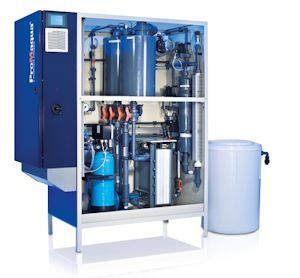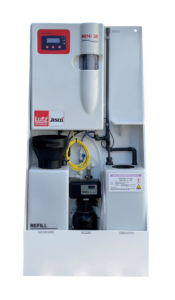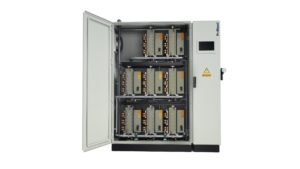Prominent Introduces Electrolysis Systems for Economical Potable Water Disinfection
A particularly economical disinfection solution which can be used to safely disinfect water in an environmentally-friendly process in line with demand was introduced at IFAT.

This is the membrane electrolysis system CHLORINSITU III. (Image: ProMinent)
The starting product for the electrolysis system is inexpensive and harmless cooking salt. A saturated solution is electrolysed in a membrane cell. Chlorine gas and diluted residual brine is produced in the anode area, which is separated by a membrane. Sodium lye and hydrogen is produced in the cathode area. The chlorine gas produced binds to the sodium hydroxide solution and is collected in a storage container as sodium-calcium hypochlorite and from there metered according to requirements using separate metering pumps. Due to its moderate pH value of approx. 9, it affects the pH of the treated water significantly less than if conventional sodium-calcium hypochlorite with a pH of 12 - 13.5 were used.
The efficiency of the electrolysis system is monitored by a complete measuring and control system. Due to this it is possible to save energy and to improve the product quality as well as to rise the life time of the membrane cell. An integrated softening system prevents the formation of lime deposits and ensures the long service life of the electrolytic cell.
By means of a pressure-independent water supply, flow monitoring of the brine and optimized anode regeneration, the product quality of the disinfectant is constant. At the same time we also achieved a reduction of the salt and energy consumption and longer service life of the membrane.
Another decisive advantage: lower chlorate concentrations that are well below 5.4 % of freshly prepared chlorine content required by DIN EN 901.
The systems are controlled using a modern PLC with large display and integrated modem for remote diagnosis and troubleshooting.
The high quality of the electrolysis cells, the low-cost raw material (cooking salt) and the greatly reduced amount of chemicals needed to adjust the pH provide the user with an extremely economical setup.
Source: ProMinent GmbH







